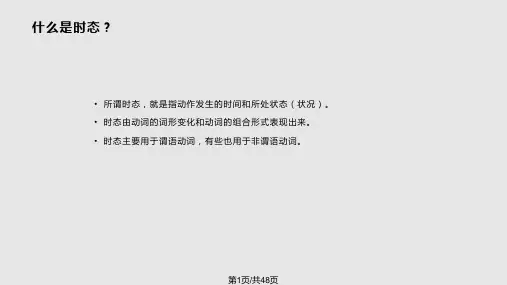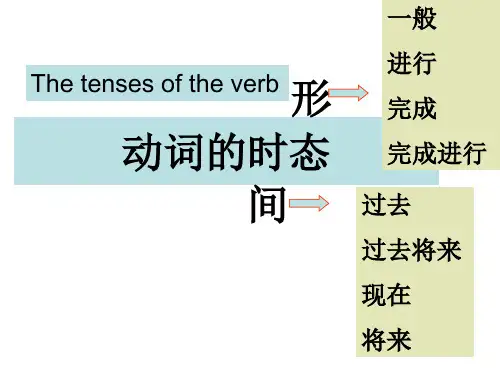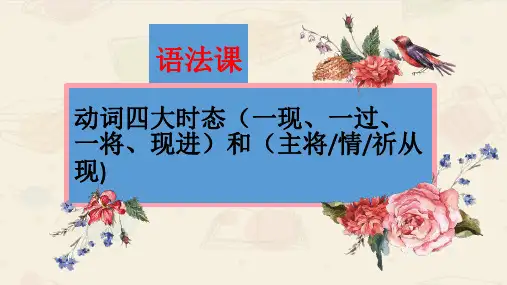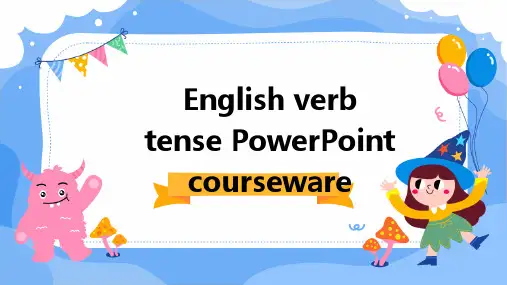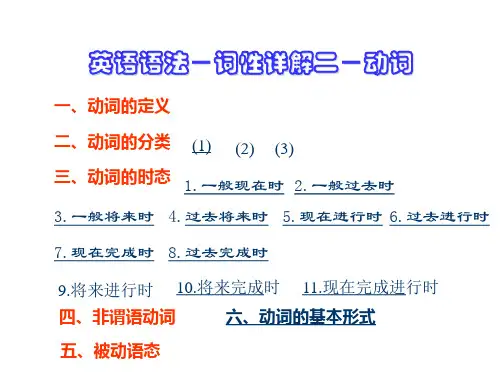- 1、下载文档前请自行甄别文档内容的完整性,平台不提供额外的编辑、内容补充、找答案等附加服务。
- 2、"仅部分预览"的文档,不可在线预览部分如存在完整性等问题,可反馈申请退款(可完整预览的文档不适用该条件!)。
- 3、如文档侵犯您的权益,请联系客服反馈,我们会尽快为您处理(人工客服工作时间:9:00-18:30)。
rang.
As we were leaving, some of our friends arrived. When we were playing in the playground , it began to rain.
过去进行时与一般过去时的区别: 过去进行时强调过去某时刻或阶段动作的进行, 不表明动作的完成, 而一般过去时表示过去某动 作已发生,表明动作已完成.
My brother has been in the army for a year. My brother joined the army one year ago.
但是: 不可持续动词的否定结构可以与” for +
时间段 ” 或since + 时间点” 连用。 e.g. I haven’t met my teacher of English for a year.
• 7. – What has happened to the fish, Mary?
• -- Mum, the chaat s__e_a_te_n_ (eat) the fish. Just now
the jcuamt _p_e_d__(jump) onto the table anadte_____(eat)
•
常搭配的时间状语:
• always often usually sometimes
• seldom never from time to time
• now and then (偶尔) every day
every ….
• once a week
• 2.表示状态:
• e.g. He is busy at the moment.
进行)的动作: • e.g. We are writing a paper these days.
一般现在时与现在进行时的区别
• 进行时强调动作正在进行,而现在时强调动作的
经常和反复,或特征,这类动作没有时间性的.
• 某些表示感官知觉的动词如: see, hear, smell,
taste等表示感觉,用一般时,不用进行时.
e.g. The Greens have stayed in China for a year.
The Greens stayed in China for a year during the war.
I have learned computer for some time. I learned computer for some time while in middle school.
afternoon yesterday.
• We were having a meeting from nine to
eleven yesterday.
• 3. 用与 when, while, as引导的表示过去的从句:
•
(注意,这样的动词必须可以持续)
• e.g. While I was watching TV, the telephone
e.g. He was writing a composition last night.(作文不一定完成) He wrote a composition last night.(作文肯定 写完了)
(Hale Waihona Puke ) 现在完成时• 构成: have / has + 动词的过去分词
• 用法:
• 1. 表示说话前某一个时刻发生的动作之结果
it up. lived
• 8. Sam ____( live) in the small town fohrafviveegyreoawrns
during the war.
saw
• 9. It is ages since I last ____(see) you. You
___(grow) taller.
Exercise:
• Water f_r_e_e_ze_s_(freeze) at the temperature 0.
• The air _k_e_e_p_s( keep ) moving all the time.
• The town _l_ie_s__( lie) to the west of the hill. • I _b_e_l_ie_v_e_( believe) you _a_re__te_l_li_n_gtell the truth now.
We haven’t met each other since he left.
• e.g. I was sorry to learn of your illness.
•
I didn’t know he was your father.
•
2)描述已故之人的动作或状态用
一般过去时.
• e.g. Edison invented the electric light.
• 2. 表示过去经常反复发生的动作.
• e.g. Do you see a plane in the sky?
• 注意:1) feel 可以用一般时和进行时表示说话
时的感觉:
• e.g. I am not feeling well today.
•
How are you feeling today?
•
I feel tired.
•
2) see, hear 有相应表示动作的动词 look
got
大家有疑问的,可以询问和交流
可以互相讨论下,但要小声点
9
(3) 一般过去时
• 表示过去某一具体时间发生过的动作.
• e.g. I reviewed my lessons last night.
•
注意: 1)有时句中虽然没有表示确定过
去时间的状语, 但根据上下文情景可以推断出是
过去发生过的动作,此时也应用一般过去时
• 表示过去某一时刻正在进行的动作.
• e.g.
• He was doing shopping this time yesterday.
• We were having a discussion at that time.
• 2. 表示过去某一阶段正在进行的动作.
• e.g. Peter was playing chess the whole
• -- __I_s_ my son __w_o_r_k_in_g___ (work) hard this term?
• -- Oh, yes, he _is__tr_y_i_n_g__(try) his best now.
• 6. D__o_e_s__ the hatfi_t______ (fit) me well?
对现在的影响。
• e.g. I have already sent him a card.
•
They have bought a new house.
• 常用的时间状语:already, just, yet
• 2. 表示从过去某一时间持续到说话时为止的
动作或状态, 常与 “ for+ 时间段 ” 或
IV. 不可持续动词与可持续动词
1)常见的词:
leave
die
put on
be away be dead wear
fail ill be ill
borrow catch a cold buy join the army
keep
have a cold have be in the army
2) 不可持续动词不能与 “ for +时间段”或since + 时间点 ” 连用,应改用持续性动词。
• e.g. Peter often played basketball when he
was in college.
3. 表示主语过去的状态或特征. e.g. It was rainy last week. He was a taxi driver years ago.
4. 在时间,条件状语从句中代替过去将来时. e.g. He would give her the book if he saw her.
at / listen to , 这些词可以用进行时
比较: Do you see a map on the wall?
He is looking at a map on the wall.
I hear a strange noise from the car engine.
He is listening to the music. 3. 有些表示状态或心理感觉的动词一般不用现在
e.g. I hope you will enjoy your meal.
I want to visit them tomorrow.
4. 当有些感觉动词词义转变,成为表示动作的动词 时,可以用进行时: e.g. Now I see the liquid in the glass has turned red.
“ since + 时间点 ” 的时间状语连用。
• e.g. We have learned English for about
three years.
• He has been here since last term.
III. 现在完成时与一般过去时的区别: 1) 完成时强调过去发生的动作的结果和影响;而 一般过去时强调动作发生的时间,地点,方式等, 与现在没有联系。 e.g. I have just had breakfast.
进行时,而用一般现在时表示状态或感觉,如 love, like, hate, want, need, wish, know(知道), understand(懂得), remember(记得), believe, guess(认为), mean(意味着), think(认为), feel(认为), fit(合适), find(认为), show(表明), have(有)
